Unit 7 Sports and Good Health Lesson 40 Move Your Body 课件(共18张PPT)
文档属性
| 名称 | Unit 7 Sports and Good Health Lesson 40 Move Your Body 课件(共18张PPT) |  | |
| 格式 | ppt | ||
| 文件大小 | 762.5KB | ||
| 资源类型 | 教案 | ||
| 版本资源 | 冀教版 | ||
| 科目 | 英语 | ||
| 更新时间 | 2022-04-22 14:51:05 | ||
图片预览

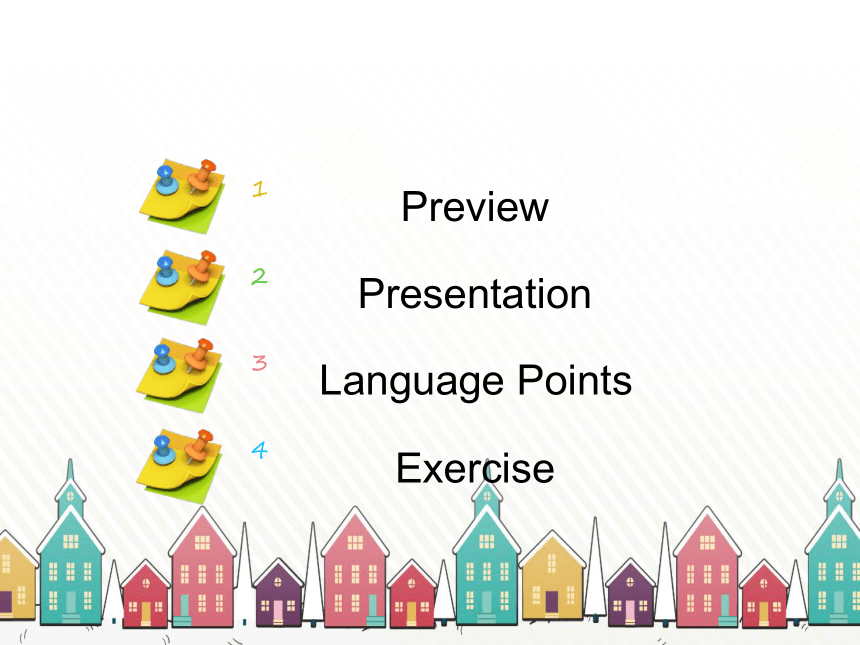
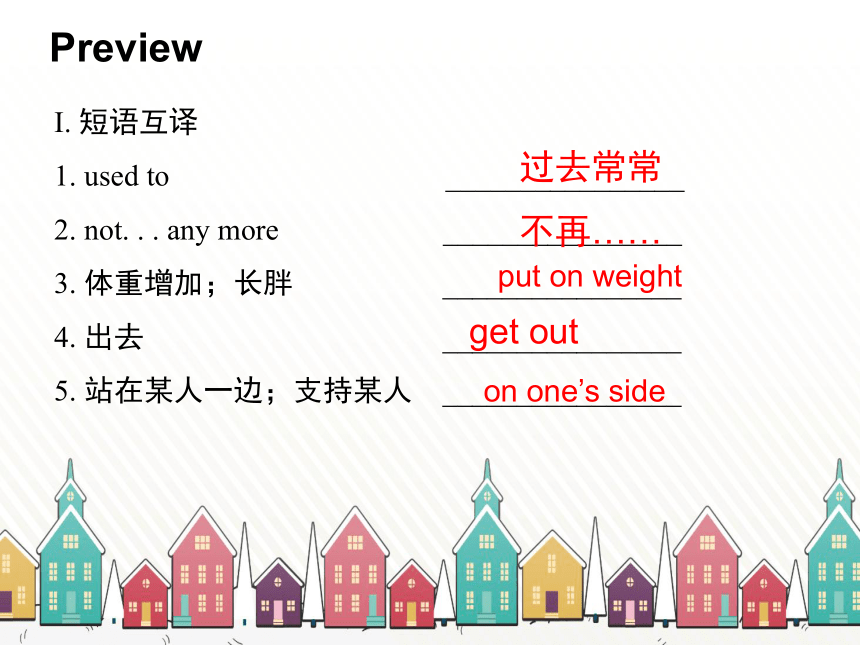
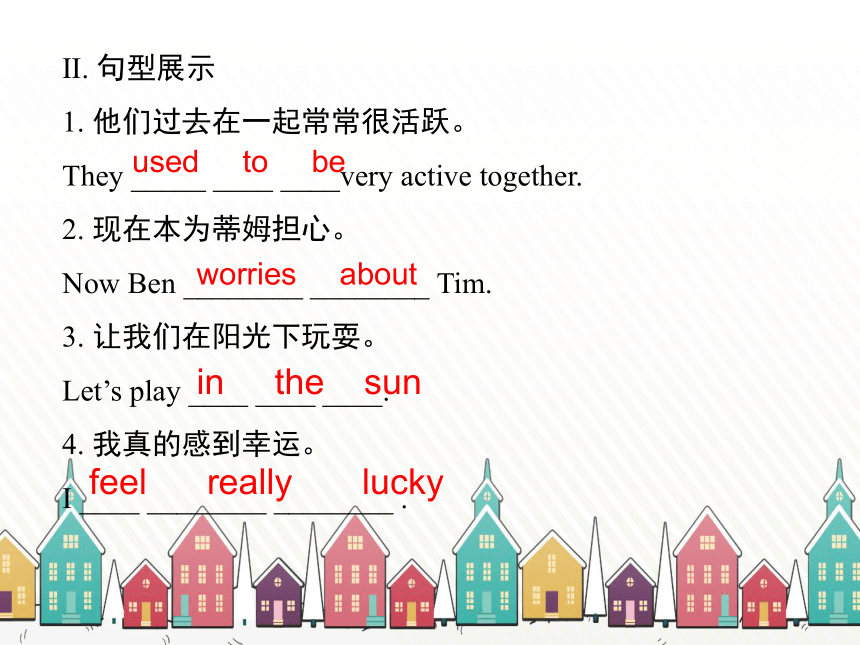
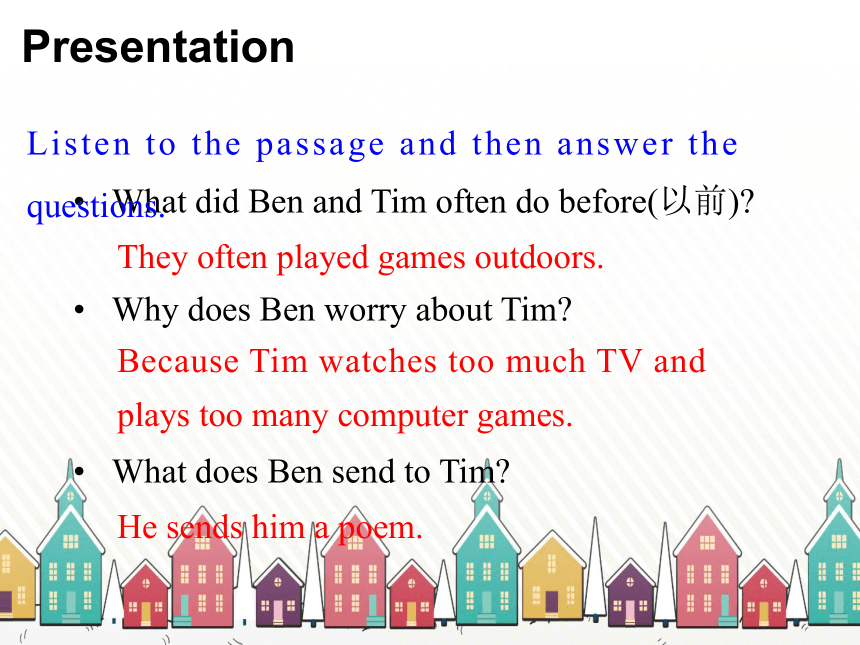
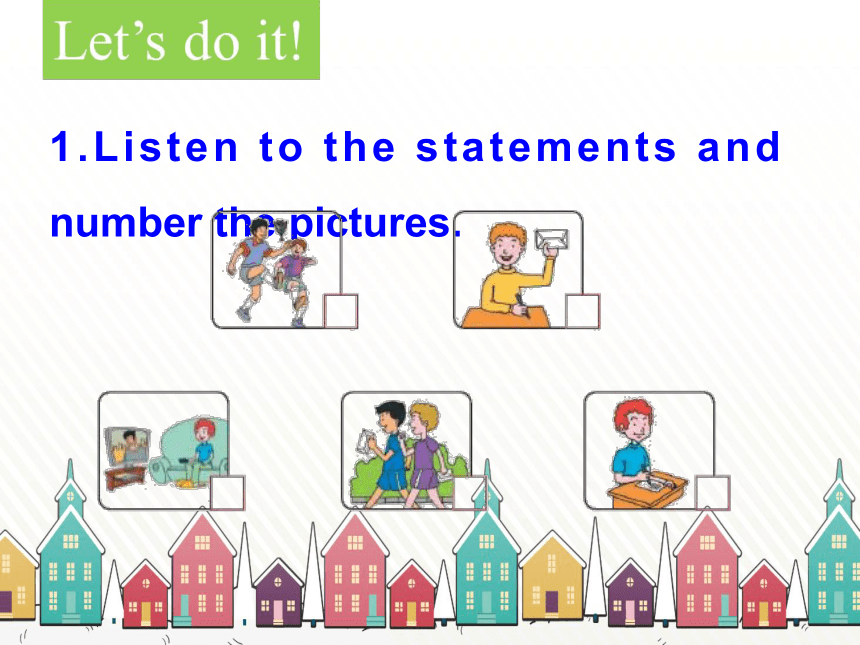
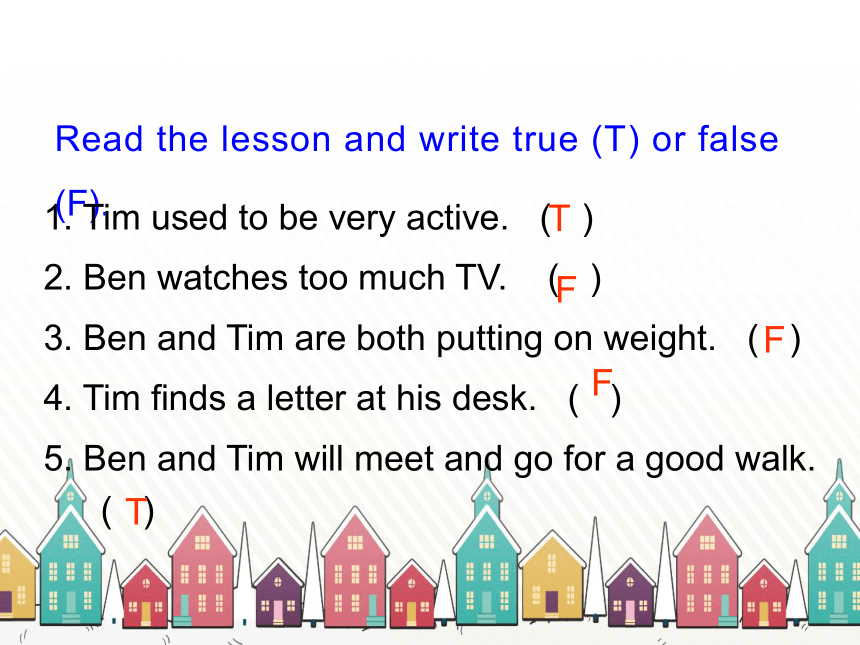
文档简介
(共18张PPT)
Unit7 Sports and Good Health
Lesson 40: Move your Body!
Preview
1
Presentation
2
Language Points
3
Exercise
4
Ⅰ. 短语互译
1. used to ________________
2. not. . . any more ________________
3. 体重增加;长胖 ________________
4. 出去 ________________
5. 站在某人一边;支持某人 ________________
Preview
过去常常
不再……
put on weight
get out
on one’s side
Ⅱ. 句型展示
1. 他们过去在一起常常很活跃。
They _____ ____ ____very active together.
2. 现在本为蒂姆担心。
Now Ben ________ ________ Tim.
3. 让我们在阳光下玩耍。
Let’s play ____ ____ ____.
4. 我真的感到幸运。
I ____ ________ ________ .
used to be
worries about
in the sun
feel really lucky
What did Ben and Tim often do before(以前)
Why does Ben worry about Tim
What does Ben send to Tim
Listen to the passage and then answer the questions.
They often played games outdoors.
Because Tim watches too much TV and plays too many computer games.
He sends him a poem.
Presentation
1.Listen to the statements and number the pictures.
Read the lesson and write true (T) or false (F).
1. Tim used to be very active. ( )
2. Ben watches too much TV. ( )
3. Ben and Tim are both putting on weight. ( )
4. Tim finds a letter at his desk. ( )
5. Ben and Tim will meet and go for a good walk. ( )
T
F
F
F
T
Fill in the blanks with the correct forms of the phrases in the box.
worry about go for a walk put on weight uses to any more
1. A: How do you go to school, Mike
B: I ______________ walk to school, but now I ride a bike.
2. A: Be careful and don’t stay out too late.
B: Don’t ______________ me, Mum! I will be OK!
3. A: How is Tom these days
B: He doesn’t get any exercise and he is not eating healthy food. He is ______________.
used to
worry about
put on weight
4. A: You and Jason are neighbours, right
B: No. He moved to a new house. He is not my neighbour ______________.
5. A: What do you like to do after supper
B: I like to ______________.
any more
go for a walk
worry about go for a walk put on weight uses to any more
Fill in the blanks with the correct forms of the phrases in the box.
1.They used to be very active together.
他们过去在一起常常很活跃。
【点拨】used to do 表示过去常常做某事,描述过去经常发生的动作或存在的状态,而现在却不再发生。其中的to是不定式符号,不是介词,所以其后接动词原形(不接动名词)。例如:
He used to live in Paris. 他过去一直住在巴黎。
Language points
【用法辨析】与used to不同搭配的用法
be used to doing 意为“习惯于做某事”,其中的to是介词,后接动词要用动名词 He is used to living in the country.他已习惯于住在乡下。
be used to do sth. 表示“……被用来做某事”,是动词use的被动语态结构(此时意为“被用来”,其中的to为不定式符号,其后要接动词原形) This kind of machine is used to make books.
这种机器是用来制造书的。
2. But I feel really lucky. 但是我真的感到幸运。
【点拨】lucky为形容词,是由名词luck加-y构成的形容词。其反义词为unlucky。例如:You are lucky. 你是幸运的。
【点拨】lucky变形记
luck 名词(不可数),意为“运气,好运,幸运” Good luck!
好运!
luckily 副词,意为“幸运地,幸亏,侥幸” Luckily there was a doctor on the spot.
幸运的是现场有一位医生。
Ⅰ. 用所给词的适当形式填空
1. My grandfather used to_________ (live) in the country, but now he lives with us.
2. I began to put on _________ (weigh) since I had these medicine.
3. The boy is _________ (luck) to have a chance to speak to foreigners.
Exercise
live
weight
lucky
4. I’m on _________ (you) side in this question.
5. Let’s _________ (visit) the Great Wall tomorrow.
your
visit
Ⅱ. 单项填空
1. Don’t spend _________ time playing _________ computer games. It’s bad for you.
A. too much; too much B. too many; too many
C. too much; too many D. too many; too much
2. My father used to _________ in a middle school. But now
he works in a bank.
A. work B. worked C. working D. works
3. Don’t worry _________ your baby. He is very well.
A. at B. with C. about D. on
4. Don’t read books _________ the sun. It’s bad for your eyes.
A. under B. in C. below D. on
5. Don’t smoke _________. It’s bad for your health.
A. any much B. any more
C. no more D. many
Work in groups. Good friends are important. They help each other. Did a friend ever help you Did you ever help a friend What happened
Talk about it.
Homework
Unit7 Sports and Good Health
Lesson 40: Move your Body!
Preview
1
Presentation
2
Language Points
3
Exercise
4
Ⅰ. 短语互译
1. used to ________________
2. not. . . any more ________________
3. 体重增加;长胖 ________________
4. 出去 ________________
5. 站在某人一边;支持某人 ________________
Preview
过去常常
不再……
put on weight
get out
on one’s side
Ⅱ. 句型展示
1. 他们过去在一起常常很活跃。
They _____ ____ ____very active together.
2. 现在本为蒂姆担心。
Now Ben ________ ________ Tim.
3. 让我们在阳光下玩耍。
Let’s play ____ ____ ____.
4. 我真的感到幸运。
I ____ ________ ________ .
used to be
worries about
in the sun
feel really lucky
What did Ben and Tim often do before(以前)
Why does Ben worry about Tim
What does Ben send to Tim
Listen to the passage and then answer the questions.
They often played games outdoors.
Because Tim watches too much TV and plays too many computer games.
He sends him a poem.
Presentation
1.Listen to the statements and number the pictures.
Read the lesson and write true (T) or false (F).
1. Tim used to be very active. ( )
2. Ben watches too much TV. ( )
3. Ben and Tim are both putting on weight. ( )
4. Tim finds a letter at his desk. ( )
5. Ben and Tim will meet and go for a good walk. ( )
T
F
F
F
T
Fill in the blanks with the correct forms of the phrases in the box.
worry about go for a walk put on weight uses to any more
1. A: How do you go to school, Mike
B: I ______________ walk to school, but now I ride a bike.
2. A: Be careful and don’t stay out too late.
B: Don’t ______________ me, Mum! I will be OK!
3. A: How is Tom these days
B: He doesn’t get any exercise and he is not eating healthy food. He is ______________.
used to
worry about
put on weight
4. A: You and Jason are neighbours, right
B: No. He moved to a new house. He is not my neighbour ______________.
5. A: What do you like to do after supper
B: I like to ______________.
any more
go for a walk
worry about go for a walk put on weight uses to any more
Fill in the blanks with the correct forms of the phrases in the box.
1.They used to be very active together.
他们过去在一起常常很活跃。
【点拨】used to do 表示过去常常做某事,描述过去经常发生的动作或存在的状态,而现在却不再发生。其中的to是不定式符号,不是介词,所以其后接动词原形(不接动名词)。例如:
He used to live in Paris. 他过去一直住在巴黎。
Language points
【用法辨析】与used to不同搭配的用法
be used to doing 意为“习惯于做某事”,其中的to是介词,后接动词要用动名词 He is used to living in the country.他已习惯于住在乡下。
be used to do sth. 表示“……被用来做某事”,是动词use的被动语态结构(此时意为“被用来”,其中的to为不定式符号,其后要接动词原形) This kind of machine is used to make books.
这种机器是用来制造书的。
2. But I feel really lucky. 但是我真的感到幸运。
【点拨】lucky为形容词,是由名词luck加-y构成的形容词。其反义词为unlucky。例如:You are lucky. 你是幸运的。
【点拨】lucky变形记
luck 名词(不可数),意为“运气,好运,幸运” Good luck!
好运!
luckily 副词,意为“幸运地,幸亏,侥幸” Luckily there was a doctor on the spot.
幸运的是现场有一位医生。
Ⅰ. 用所给词的适当形式填空
1. My grandfather used to_________ (live) in the country, but now he lives with us.
2. I began to put on _________ (weigh) since I had these medicine.
3. The boy is _________ (luck) to have a chance to speak to foreigners.
Exercise
live
weight
lucky
4. I’m on _________ (you) side in this question.
5. Let’s _________ (visit) the Great Wall tomorrow.
your
visit
Ⅱ. 单项填空
1. Don’t spend _________ time playing _________ computer games. It’s bad for you.
A. too much; too much B. too many; too many
C. too much; too many D. too many; too much
2. My father used to _________ in a middle school. But now
he works in a bank.
A. work B. worked C. working D. works
3. Don’t worry _________ your baby. He is very well.
A. at B. with C. about D. on
4. Don’t read books _________ the sun. It’s bad for your eyes.
A. under B. in C. below D. on
5. Don’t smoke _________. It’s bad for your health.
A. any much B. any more
C. no more D. many
Work in groups. Good friends are important. They help each other. Did a friend ever help you Did you ever help a friend What happened
Talk about it.
Homework
同课章节目录
- Unit 1 A Trip to the Silk Road
- Lesson 1 A Trip to China
- Lesson 2 Meet You in Beijing
- Lesson 3 A Visit to Xi'an
- Lesson 4 A Visit to Lanzhou
- Lesson 5 Another Stop along the Silk Road
- Lesson 6 Jenny's Diary
- Unit 2 It's Show Time!
- Lesson 7 What's Your Project about?
- Lesson 8 Marco Polo and the Silk Road
- Lesson 9 Danny's School Project
- Lesson 10 Music and Dance
- Lesson 11 Food in China
- Lesson 12 A Blog about the Silk Road
- Unit 3 School Life
- Lesson 13 How Is School Going?
- Lesson 14 Jenny's School Life
- Lesson 15 Making a Difference
- Lesson 16 We Are with You!
- Lesson 17 School Science Fai
- Lesson 18 Teaching in China
- Unit 4 After-School Activities
- Lesson 19 A Dinner Date
- Lesson 20 Join Our Club!
- Lesson 21 What Is Your Club Type?
- Lesson 22 Big Plans for the Weekend
- Lesson 23 A Weekend with Grandma
- Lesson 24 How was Your Weekend?
- Unit 5 I Love Learning English!
- Lesson 25 A Phone Friend
- Lesson 26 Online Phone Calls
- Lesson 27 Amazing English
- Lesson 28 How Do I Learn English?
- Lesson 29 A Door to the World
- Lesson 30 Writing an E-mail in English
- Unit 6 Seasons
- Lesson 31 What Strange Weather!
- Lesson 32 I Can't Wait for Winter!
- Lesson 33 Kim's Favourite Season
- Lesson 34 Steven's Report
- Lesson 35 Surfing in Sydney
- Lesson 36 Spring in China
- Unit 7 Sports and Good Health
- Lesson 37 You Are What You Eat!
- Lesson 38 Stay Healthy!
- Lesson 39 Danny's Report
- Lesson 40 Move Your Body
- Lesson 41 Were People Healthy Then?
- Lesson 42 Know Yourself
- Unit 8 Summer Holiday Is Coming!
- Lesson 43 Have a Good Summer!
- Lesson 44 Volunteering in Summe
- Lesson 45 Baseball Season
- Lesson 46 Get Ready for Summer Holiday!
- Lesson 47 Summer Plans
- Lesson 48 Li Ming's Summer Holiday
